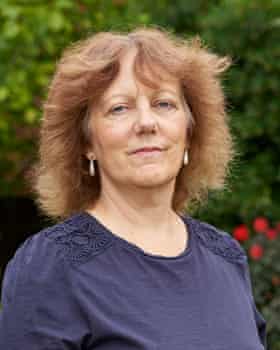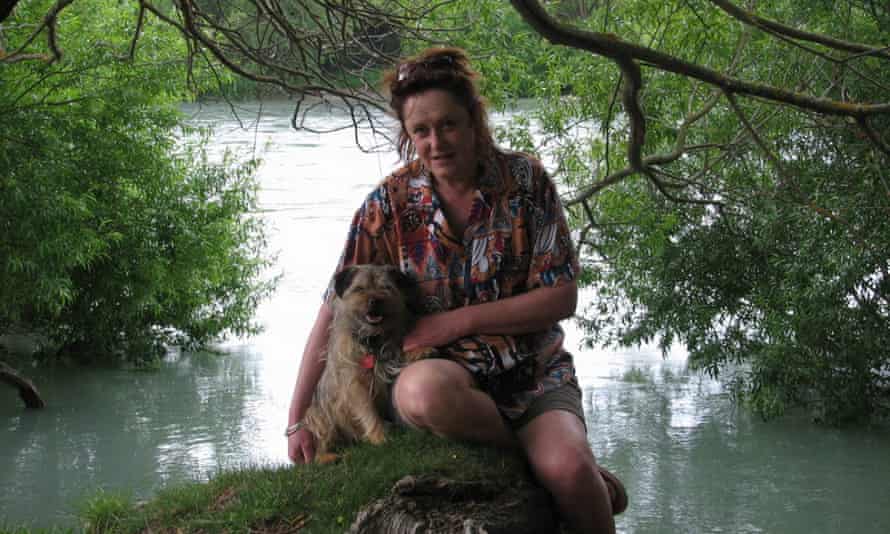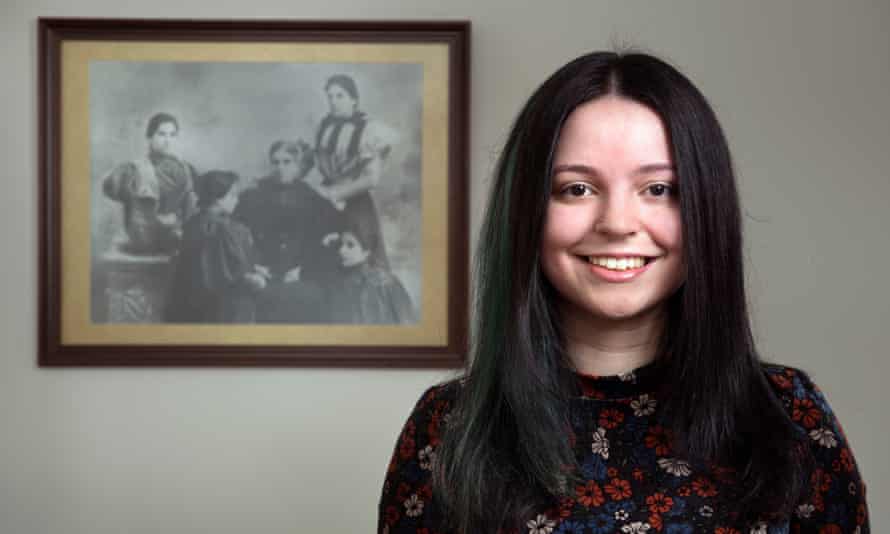Do Not Reveal What They Have to Family Memebrs or to Anyone Who Deosnt Know It
The kickoff surprise of Michèle's Dna test was how much saliva it took. "Information technology was daunting. Information technology took u.s.a., similar, 20 minutes. And the more nosotros laughed, the harder it was to do."
It was May 2016, and she and her now married man had ordered the kits as very early Christmas presents for themselves. They had been researching their family trees – Michèle had traced her father's family back as far as the 1600s – and had wanted to examination their Dna but had been put off past the price. They were saving for a fertility treatment and had merely recently moved to Florida from New York.
But Michèle was because going back to study, and she had been told she had some Native American blood on her male parent's side – maybe if she could say how much, she figured, she would be eligible for scholarships. And so she and her husband came to be cracking up, spitting into their individual vials. "We joked about sending them sweetener samples, to meet if it nonetheless works."
In bed 1 night six weeks after, they pulled up the results from AncestryDNA on the laptop. They were impressed past the news nigh Michèle's married man, which mostly reflected what he had always been told about his family. And so they opened Michèle's results. "The get-go thing that popped up is a pie nautical chart, and 1 whole one-half was red and said 'Italy'.

"I was dumbfounded. Like: 'Well, that's a huge mistake. They must have mixed mine up with someone else's.'" She laughs, but you can hear it is difficult-won. "My husband looks through it, then he says: 'Honey, they didn't make a mistake. This is you.'" That night, Michèle had her first ever anxiety set on.
Recently DNA testing – once only accessible to doctors and detectives – has been extended to anyone curious about where they came from and willing to spend the best part of £100 to find out. Since launching in May 2012, AncestryDNA says it has tested more 10 meg people in xxx countries. 23andMe says it has more than v million subscribers; FamilyTreeDNA claims 2 million.
All of them are racing to grow their databases and their accuracy. AncestryDNA is particularly visible, sponsoring the telly program Long Lost Family unit and running expensive adverts inviting people to discover their inner Viking ("This sword is your history") or their innate links to the EU post-Brexit.
It all sounds harmless, until you lot acquire that every bit well as revealing customers' ethnic origins, many DNA tests will besides identify relatives in the companies' databases. This "DNA-matching" can throw up previously unknown or unacknowledged brothers and sisters, cousins, uncles and aunts … or fifty-fifty reveal that the human you call dad is not your biological father. This is one reason that the United kingdom of great britain and northern ireland's Human Fertility and Embryology Dominance is now calling on Deoxyribonucleic acid testing services to warn customers about the possible emotional fallout.
The kits that screen for genetic health risks can deliver every bit devastating results. All the same all of these tests are typically taken in a spirit of casual curiosity. People are non prepared to have their lives rocked by what they may find out.
As her results sank in, Michèle says: "I merely got very quiet. All these things from my past suddenly started going through my caput: questions, feelings, things that couldn't exist explained, things that my mother would go angry or defensive near if I brought them upwardly. I started to realise: 'I recollect I've discovered a secret.'"
That nighttime, she called her estranged mother, breaking their 2-year silence. She strenuously denied any knowledge of Italian ancestry – and still Michèle idea there might have been a error. AncestryDNA'southward database showed her as having offset cousins in Syracuse, NY, where she had grown up, with an Italian surname she did non recognise.
The next morning time Michèle called her aunt, who had but been 10 years quondam when Michèle's mother had got pregnant at 18. Her DNA matches open up on her laptop in front of her, Michèle asked her aunt if she remembered her female parent dating an Italian boy in senior year. "I'g looking at the last name: 100% match, first cousin. And my aunt says: 'The only guy I remember who comes to listen is her prom appointment.' And she says that same surname.
"I stood up, my laptop went to the floor, I dropped my phone and I ran to the bathroom and started vomiting."
In a serial of text letters, Michèle'southward mother furiously denied that her prom date was Michèle's father, adding (Michèle says) that "information technology wouldn't matter anyway", since he had died in a motorcycle blow the previous yr. "That's how I establish that out. It was very vicious." Michèle constitute his obituary online, accompanied by a photo of a human being with night hair and olive skin. "It was literally the male version of me."
A subsequent paternity test of the man she had thought was her begetter confirmed that in that location was no relation. "That was devastating for both of us," says Michèle. He had not figured in her life when she was growing up, and they had just recently reconnected. She had moved to Florida in part to be closer to him.

Despite the absence of claret ties, he remains very much in Michèle's life; paradoxically, she says, the discovery made their human relationship stronger. Just she has severed all ties with her female parent who, three years on, continues to deny the results of three DNA tests.
Michèle'southward story may sound dramatic, but information technology is not unique. Increasingly, DNA tests are bringing to calorie-free infidelities, adoptions, cover-ups and lies that have been curtained for decades.
There take been cases of people learning that they were conceived from donated sperm or even that they were switched at birth, says genealogist Debbie Kennett. "There have been a lot of secrets covered up in the past, and they are starting to come out."
Last year, AncestryDNA made matches opt-in to comply with data retention legislation; keeping a "tin can of worms" shut may have been an added bonus, Kennett suggests. The company says that while almost every customer encounters surprises on their "self-discovery journey", these are by and large "heady and enriching"; for those with "more sensitive queries", there is a dedicated team of experienced staff. Besides, 23AndMe says information technology had specially trained customer-intendance representatives.
"When people get these unexpected findings, they tend to distrust the science at get-go," says Kennett. "Simply even shut matches can simply reveal so much in isolation. The Deoxyribonucleic acid on its own doesn't requite the scientific discipline – you need the contextual family information equally well."
When, in June, Kathy Piercy was contacted by a adult female claiming to be her first cousin, she was initially sceptical. "I idea: 'Yeah, right – I know all my cousins.' Only at that place's no doubting Dna." She had joined AncestryDNA iv months earlier to find out more than virtually her ancestors' journey from Ireland to New Zealand, where she lives "on a dusty road out the back of nowhere" in the rural Canterbury region. "In New Zealand and Australia, we've got unlike bits and pieces in united states of america, and so it's more relevant. I wasn't looking for anything in particular, because I didn't know there was anything to find."
But Judy Poole did. Raised past adoptive parents, every bit an adult she forged a tenuous human relationship with her biological mother, who refused to talk over her begetter's identity. She had sent her sample to AncestryDNA in April hoping that it might throw up clues, but was not at all expectant. Kathy was listed equally her offset cousin. Afterward some back and forth and "a flake of maths", says Kathy, they pieced together that her father was Kathy's uncle, who at xix had had a fling before his spousal relationship. He died in 2012. "Whether he knew of Judy'due south existence, we will never know," says Kathy. Only she was able to put Judy in touch with his son, her half-brother – "and he was over the moon to take a large sister", she says.
Judy was taken aback by their instant connection – non to mention the physical resemblance. "I really practice look like Kathy. I've got my father'due south optics." She did not have an especially happy childhood, she says, so to have gained a new family has been "really special". "If annihilation, you lot showtime losing relationships in later life – simply I think what I actually got out of spending time together was that I felt valued." She adds: "That's probably something that hasn't been in my life before."
Laura House, a genetic genealogist studying at the Academy of Strathclyde, had a more complicated encounter with Deoxyribonucleic acid testing. In researching her own family, House learned her grandmother was illegitimate, the result of an extramarital affair that her bang-up-grandmother had kept secret all her life. For her mother and aunt, "to learn something and then significant well-nigh their female parent, so long after she died, was quite moving", she says. "There was a lot of pathos because my grandmother never knew the truth near who she really was, and [the man she thought was her father] was very important to anybody. His proper noun was a part of our identity."
The finding has caused tension within House's family, and some members continue to doubt it. That is the risk with Deoxyribonucleic acid tests, she says: not everyone is set to learn that what they believe to be true, is not – peculiarly secondhand. "You don't accept to accept tested yourself to observe that your father is not your father." And as more than DNA is added to the database, you could be in shop for more surprises.
Daily activity in an AncestryDNA community on Facebook highlights how hands they are uncovered. "Why does my sister testify as a close family member or get-go cousin?" someone posted recently; "Half sisters," was the answer, "sorry if u didn't know." Another user posted about finding her father in less than 24 hours of getting her results: "I'm the happiest daughter in the earth right now … He didn't fifty-fifty know I existed."

House says at that place needs to be more advice about how to approach those hard conversations – it could even be included with the test kit. "People are beingness flung into these situations that are ethically extremely complicated and possibly stressful, and they demand to be able to manage it.
"Anything they find out will have implications for their family. The advert that says 'I spat in a tube and discovered I was a Viking' does not give whatsoever sense that that is the situation y'all may find yourself in."
With tests that offer health screening, even surprises yous take signed up for can have life-altering consequences. For case, 23andMe screens for genetic risk of diseases including Parkinson's and late-onset Alzheimer'south, besides as whether you are a carrier for cystic fibrosis, amongst other atmospheric condition.
Next calendar month, Sara Altschule, a 31-year-old writer based in Los Angeles, will undergo a preventative double mastectomy subsequently 23andMe revealed that she had a roughly 70% chance of developing breast cancer. She had been given the exam by her sister, although as a self-described "light hypochondriac", she had paid for the health screening upgrade herself. Her greatest fear was that the results would bear witness a hazard of developing Alzheimer'south. "I was so excited that I merely had 1 variant, I recollect for coeliac disease."
Seven months afterwards, in March this twelvemonth, Altschule received an email from 23andMe, saying it had but been approved to test for iii BRCA gene mutations linked to an increased hereditary risk of breast cancer. She opted in: "I believe that knowledge is power." The results returned positive for the same BRCA two variant carried by her father's cousin, who had gone on to develop cancer. The adjacent working day she took a printout to a genetic counsellor.
To get that email, she says, "is actually scary and overwhelming – it'south different from a person walking you through it". Merely it was too accessible. Being Ashkenazi Jewish, her risk of having such a mutation was about one in twoscore, which she did not know before she was diagnosed. "At first it doesn't feel as if information technology's skillful news, but I look at information technology this fashion: at present I tin take charge of my health."
She credits 23andMe'southward testing with saving her life, although, she adds, it is hardly exhaustive, even for the conditions information technology does appraise. "In reality, I probably have so many chances of developing so many things that the test doesn't test for." (A spokesperson for 23andMe stressed that it was non a diagnostic test, and that the many steps involved meant "the customer should exist fully informed of what all the possible outcomes of the written report might be, before they have even sent off their kit for testing".)
Asked if she would take agreed to exist tested for a condition that she was powerless to forestall or reduce her chances of developing, Altschule isn't sure. "If there's zero you can do most it, I don't call back it would exist helpful." But she seems to reconsider mid-answer. "It would definitely be hard – but if yous have that information, I think any person just wants to know. But you accept to exist ready for the reply."
In August 2016, not iii months after she had sent off her saliva sample, Michèle flew to New York to visit 80 family members she had never met. Michèle's grandmother was delighted to meet her, her but granddaughter – and even more so to learn that she was meaning. Her uncle took her to run into her begetter's grave.
She remembers her four-day visit equally overwhelming, exhausting and surreal. "It took me at least a couple of weeks to recover," she says. "Merely they welcomed me with open up arms."
Despite all that she has gained as a result – self-knowledge, a family – Michèle remains ambivalent about her "traumatic" discovery. "In that location have been times when I'm merely kind of breaking down, and so angry and lamentable, that I say I wish I had never opened Pandora'southward box," she says, tearfully. Therapy, writing and, in item, the nascency of her daughter take helped her to move on.
A few weeks ago, she felt able to return to AncestryDNA, for the first time in two-and-a-half years. On logging in, she was told her ethnicity results had been updated. She was gripped by a sudden fear: what if it really had been all a mistake?
But, she says with a snort: "I was fifty-fifty more Italian than I'd thought I was."
Source: https://www.theguardian.com/lifeandstyle/2018/sep/18/your-fathers-not-your-father-when-dna-tests-reveal-more-than-you-bargained-for
0 Response to "Do Not Reveal What They Have to Family Memebrs or to Anyone Who Deosnt Know It"
Post a Comment